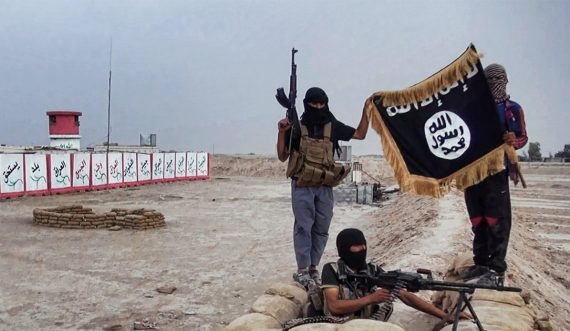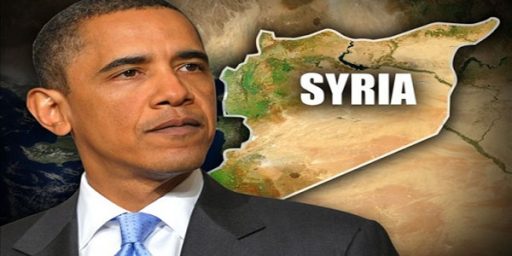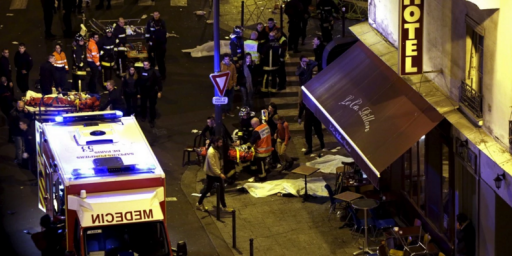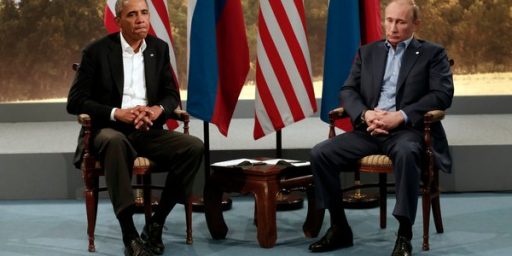American-Backed Forces Capture Raqqa, But ISIS Is Far From Defeated
The capital of the purported caliphate declared by ISIS has apparently fallen, but that doesn't mean the end of ISIS. In fact, it may make the group more dangerous.
American-backed forces have apparently captured the city of Raqqa, Syria, which served as the headquarters for ISIS and the capital of its self-proclaimed caliphate, in what is being hailed as a major victory against the terror organization but which likely will just mean a shift in strategy for ISIS:
BEIRUT, Lebanon — American-backed forces said on Tuesday that they had seized the northern Syrian city of Raqqa from the Islamic State, a major blow to the militant group, which had long used the city as the de facto capital of its self-declared caliphate.
Celebrations erupted in Raqqa, where residents had lived under the repressive rule of militants who beheaded people for offenses as minor as smoking. Fighters could be seen cheering and firing celebratory gunfire in the streets, according to residents reached by phone and text message.
The United States Central Command stopped short of declaring victory, saying that “more than 90 percent of Raqqa is in S.D.F. control,” a reference to the Syrian Democratic Forces, an American-backed militia group made up of Syrian Kurds and Arabs.
Col. Ryan S. Dillon, a spokesman for the United States military in Baghdad, said Tuesday that Raqqa was on the verge of being liberated, but that there were still pockets of the city controlled by the Islamic State. Syrian Democratic Forces officers, however, were emphatic in phone interviews and public statements that they had finally wrested control of the city from the militants after a monthslong campaign.
“The military operation is over,” said Talal Salo, a commander reached by phone at the group’s headquarters in Hasaka.
Still, a spokesman for the Syrian Democratic Forces, Moustapha Bali, said suicide bombers might still be hiding in the city. In a video teleconference with Pentagon reporters, Colonel Dillon also said that Islamic State fighters had booby-trapped the city with improvised explosive devices and unexploded ordnance that officials say could take years to remove.
Whether final or not, the seemingly inevitable defeat in Raqqa of the Islamic State, also known as ISIS or ISIL, carries heavy symbolic weight. At its height in 2014, the group controlled Iraq’s second-largest city, Mosul, as well as Raqqa and large stretches of land on both sides of the border. And it had grand aspirations to increase its territory and cement its rule.
The Islamic State leader, Abu Bakr al-Baghdadi, who once spent time in a prison run by occupying American troops in Iraq, claimed to be the successor to the caliphs, the Islamic emperors who shaped the region in past centuries. He persuaded tens of thousands of Muslims from around the world, some new to the faith or poorly versed in it, to travel to the region to fight. The group seized the ancient ruins of Palmyra in Syria and those of Hatra in Iraq, destroying important historical monuments in the name of its interpretation of Islam.
With the fall of Raqqa, the Islamic State has lost the two most important cities of its self-declared caliphate in three months. It was pushed out of Mosul in July, and now holds only a fraction of the territory it once controlled.
Analysts say the group is already preparing for a new phase, morphing back into the kind of underground insurgency it started as, when it took root among disaffected Sunni populations that were willing to tolerate, if not wholeheartedly embrace, its ultraconservative brand of Islam. And while many Arabs quickly soured on the group because of its brutal crackdowns and unfulfilled promises, their underlying political disaffection has not been addressed.
Another major concern, now that Islamic State-held territory is reduced, is how countries in Europe, in the Middle East and around the world will handle the foreigners who joined the group in places like Syria and might return home and plan attacks there.
A victory in Raqqa has come at a heavy cost. Much of the city has been devastated by American-led airstrikes that killed more than 1,000 civilians, according to tallies by local activists and international monitors. In earlier years, many were killed by Russian and Syrian government strikes. About 270,000 residents have been displaced by the fighting, and thousands of homes have been destroyed.
While the fall of Raqqa is certainly a significant military achievement that seemingly puts an end to the idea that the Islamic State was a nation in anything but name only, that doesn’t mean that ISIS itself has been defeated or that it doesn’t remain a continuing and ongoing threat to the United States and the west. Indeed, some analysts are suggesting that the fall of Raqqa could make the group an even more potent threat to the outside world than it had been before:
Its de facto capital is falling. Its territory has shriveled from the size of Portugal to a handful of outposts. Its surviving leaders are on the run.
But rather than declare the Islamic State and its virulent ideology conquered, many Western and Arab counterterrorism officials are bracing for a new, lethal incarnation of the jihadi group.
The organization has a proven track record as an insurgency able to withstand major military onslaughts, while still recruiting adherents around the world ready to kill in its name.
Islamic State leaders signaled more than a year ago that they had drawn up contingency plans to revert to their roots as a guerrilla force after the loss of their territory in Iraq and Syria. Nor does the group need to govern cities to inspire so-called lone wolf terrorist attacks abroad, a strategy it has already adopted to devastating effect in Manchester, England, and Orlando, Fla.
“Islamic State is not finished,” said Aaron Y. Zelin, who studies jihadi movements at The Washington Institute for Near East Policy. “I.S. has a plan, and that is to wait out their enemies locally in order to gain time to rebuild their networks while at the same time provide inspiration to followers outside to keep fighting their enemies farther away.'”
Even with the news on Tuesday that American-backed forces said they had captured Raqqa, the capital of the group’s self-declared caliphate, European counterterrorism officials were worrying about sleeper cells that may have been sent out well before the battlefield losses mounted.
In Iraq, where the group that became the Islamic State took root, security officials are bracing for future waves of suicide attacks against civilians. And even if governments are able to head off organized plots like the Paris attacks of 2015, officials around the globe concede that they have almost no way of stopping lone wolf assaults inspired or enabled by Islamic State propaganda that lives online.
“It is clear that we are contending with an intense U.K. terrorist threat from Islamist extremists,” Andrew Parker, the director of Britain’s MI5 intelligence service, said in a speech on Tuesday. “That threat is multidimensional, evolving rapidly, and operating at a scale and pace we’ve not seen before.”
American and European counterterrorism officials acknowledge that they do not know the exact capabilities the Islamic State retains, or how much the appeal of the group’s ideology has been dented by its string of heavy military defeats.
Gen. Joseph F. Dunford Jr., the chairman of the Joint Chiefs of Staff, predicted last month that the loss of territory would precipitate a loss of credibility. “We’ll continue to see reduction in territory, reduction in freedom of movement, reduced resources and less credibility in the narrative,” he told a Senate hearing.
Others are less sanguine. They point to a speech by the Islamic State spokesman Abu Muhammed al-Adnani, before his death in an American drone strike last year, urging the group’s followers to fight on as a lean, agile insurgency instead of the bureaucratic juggernaut it had become.
“True defeat is the loss of willpower and desire to fight,” he said. “We would be defeated and you victorious only if you were able to remove the Quran from the Muslims’ hearts.”
The group’s ability to weld religious fervor to the political resentments of disenfranchised Sunni Muslims in Shiite-dominated Iraq already saved it once, when it appeared broken by the American military surge in Iraq in 2007 and 2008.
By the time American forces withdrew from Iraq in 2011, intelligence officials estimated that the Islamic State’s predecessor, then called the Islamic State of Iraq, was down to its last 700 fighters. The group was considered such a minor threat that the reward offered by the United States for the capture of its leader plummeted from $5 million to $100,000.
It took less than three years for those beaten-down and diminished insurgents to regroup and roar across Iraq and Syria, declaring an Islamic caliphate from the Mediterranean coast of Syria nearly to the Iraqi capital, Baghdad. It became both the world’s wealthiest terrorist group, and the most feared.
Even with the loss of most of that territory, the organization is far from defeated, and remains far stronger today than it did when American troops pulled out of Iraq.
The group currently has from 6,000 to 10,000 fighters in Iraq and Syria, the United States-led coalition said on Friday. That is eight to 14 times the number it had in 2011.
“That’s the relevant comparison,” said Daniel L. Byman, a senior fellow at the Brookings Institution’s Center for Middle East Policy, who tracks jihadist groups. “This is a very strong group which has a lot of sympathizers, its ideas are embedded and it has networks. It has a lot to draw on even as it loses its physical territory.”
The group has also developed a powerful social media network that with no physical presence allows it to spew propaganda, claim responsibility for terrorist attacks, and not just inspire attacks but also help plot and execute them remotely.
A large share of its attacks in the West in recent years have been carried out by men who communicated online with ISIS, taking detailed instructions through encrypted messages, but never meeting their terrorist mentors.
In addition to the fact that it has shifted much of its activity aimed at the West to the online world and to efforts that amount to encouraging lone wolf style terror attacks that don’t necessarily require direct ISIS involvement or training, the group also remains a potent force on the ground even with the loss of Raqqa and Mosul. According to Central Command estimates and other projections, there are still upward of 10,000 ISIS fighters in Iraq and Syria, many of whom appear to have gone underground in the face of recent defeats on the ground in those countries. Additionally, the group remains in control of a wide swath of area in Iraq and Syria that amounts to at least 4,000 square miles or more and that it remains the largest armed militia inside Syria, a nation where chaos is the order of the day. Finally, it’s position in Iraq will likely be strengthened if the current unrest between the government in Baghdad and Iraqi Kurds over the Kurdish independence referendum results in a breakdown in the rough alliance between Iraqi Kurds and Arabs that had led to much of the success against ISIS in Iraq. At the very least, the current fighting to retake Kirkuk seems to be likely to increase chaos in Iraq if it erupts into wider fighting, and that chaos can only serve to benefit ISIS.
In addition to the fact that they remain a potent force on the ground, ISIS has also spread its influence around the world to the point where the loss of Raqqa seems unlikely to make much of a difference in its ability to strike out and advance its ideology. In recent years, even as it remained at the height of its power in Raqqa and across Syria and Iraq, the group was clearly striking out to other areas of the world both in an effort to spread its ideology and to provide for something of a fallback plan in the event of military setbacks. This has included sending fighters and others to the regions of Libya that remain beyond the control of the central government, a move that was said at the time to be something of a second base for the group in the event of U.S.-backed military success in Syria. They also moved to make alliances with groups in nations such as Afghanistan, Yemen, and Africa, including nations such as Somalia as well as contacts with the brutal Central African terror group Boko Haram.
In addition to these expansions into other unstable parts of the world that could provide both refuge for ISIS personnel and influence over terror groups already on the ground, in recent years we’ve seen plenty of proof that ISIS has the capability to strike well-beyond Syria and to influence others to undertake terror attacks in their home countries. The past several years have included such lone-wolf style attacks in France, the United Kingdom, Canada, Belgium, Spain, and other nations as well as attacks by organized cells of ISIS-trained fighters such as those responsible for the attacks on Paris in November 2015. Given all of this, the idea that the fall of Raqqa means the end of ISIS or its ability to carry out terrorist attacks is clearly false. Indeed, to the extent it sends them further into hiding rather than occupying territory that can be attacked by military forces may end up making them more dangerous in years to come.






ISIS likely will continue terror attacks around the world. Terror is the weapon of the weak. Nonetheless, taking Raqqa and the bulk of the territory ISIS once held is a huge victory. A victory a long time in the making and due the plans, and the shaky alliances, put together under Obama. I have been surprised Trump has not been loudly taking credit for each gain, although all he’s done is not interfere in the military following the course set by Obama. I see yesterday Trump did claim ISIS fighters are now surrendering because he’s prez. There is already fighting between the Kurds and the Iraqi government. I hope the alliances won’t fall apart under Trump and allow ISIS to recover.
Trumpers are trying to claim this victory for him. And he does deserved some credit … for continuing Obama’s course. It turned out his secret ISIS plan was Obama’s plan. This won’t end ISIS but it will free thousands from their yoke. That’s a good thing no matter who is President.
So, we’re just going to flush down the memory hole the hubbub about Trump giving greater leeway to commanders in the field to make decisions? Decisions they previously had to get approved by the Obama White House? Like dropping the MOAB? That, and all the commentary about it, is now on the official “That Never Happened, Shut Up” list?
Mike
The MOAB was dropped in Afghanistan, which is still an ongoing conflict. Do try to keep up.